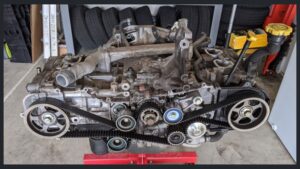
8 Reasons Your Car Makes a Rattling Noise
1) At Startup (Timing Chain Noise)
A loose timing chain tensioner can cause a rattling noise at start-up that goes away after a few seconds. In some cases, this is a normal operating sound for a large engine, but often it indicates a problem.
When the starter motor fails, it can have difficulty fully retracting the pinion, even if the engine has already started. This gear can rotate and rub against the flywheel.
2) At Low Speeds (Symptoms of a Bad Coil Spring)
Causes of rattling at low speeds include steering and suspension parts. Loose wheels are a very serious problem and can also cause rattles and severe vibrations. Always double-check the lug nuts after removing the wheels for maintenance.
Rattles at low speeds can also occur at higher speeds. You may only hear the rattle when driving slowly because there is less noise from the road, wind, and tires.
3) At High Speeds (Steering Wobble)
Rattles at high speeds can be caused by loose suspension components due to bumps or wheel imbalance. If you notice that the rattle is accompanied by additional vibrations, stop and thoroughly inspect the wheels, tires, and steering components.
4) Inside the car (noises while driving)
Interior rattles are often caused by trim parts, wiring harness parts, door parts, dashboard parts, etc. Check the glove box as well; loose items in the storage compartment can easily cause louder noises due to normal road vibrations.
5) Under the car (symptoms of a bad catalytic converter)
The exhaust system is a common source of rattles. Exhaust hangers can become loose or damaged over time, causing the exhaust system to move more than necessary.
Heat shields can also come loose and rattle. Heat shields are thin metal covers that encase some of the exhaust gases and direct heat away from sensitive components.
These components can include wiring harnesses, air intakes, brake lines, fuel tanks, or anything else that can’t withstand the relentless heat of hot exhaust. Most exhaust systems have one or more heat shields. When the catalytic converter deteriorates, fuel can attack the catalytic converter and cause a rattle.
If the honeycomb structure separates from the catalytic converter wall, it can stick to the sides. This restricts the flow of exhaust gases and can also cause a fire. Faulty transmission mounts and other transmission issues can also cause a rattle noise coming from the underside of the vehicle.
6) In the engine bay
It can be difficult to identify a rattle coming from the engine bay. The engine bay is packed with a lot of parts in a small space. For newer, more complex vehicles, the number of parts is even greater.
If you hear a rattle at idle or an abnormal noise that gets louder as the engine speed increases, check the belts and power transmission pulleys first. Make sure nothing is touching the belt or pulleys.
Using a mechanic’s stethoscope, you can pinpoint the source of the noise. This is especially helpful if you hear a rattle coming from inside the engine.
Make sure the radiator fan isn’t blocked. Radiator fans and air conditioning compressors don’t run all the time, so they can cause intermittent rattles.
7) At a constant speed
If your engine seems to be rattling at a constant speed, don’t worry. It could simply be an old heat shield rattling due to engine resonance. Internal combustion engines produce noises similar to musical instruments. Different engine speeds produce different frequencies of sound, so at some RPM ranges, a rattle may occur due to resonance.
Don’t confuse a rattle sound that may occur at certain engine speeds with a clicking or knocking sound.
8) From the rear axle
If you drive a rear-wheel drive or four-wheel drive vehicle, your car has a universal joint (or U-joint). These connections connect the driveshaft from the transmission or transfer case to the rear differential.
Rear-end rattles can be caused by a loose universal joint or a problem with the rear differential. Faulty differential mounts can also cause rattles.
Conclusion
Diagnosing the cause of a rattle can be difficult, especially if the noise vibrates the entire car. First, try to isolate the source to one area of the vehicle, then move the component back and forth to vary the noise. If any screws in this area come loose, tighten them according to the manufacturer’s torque specifications. If the screws come loose again, apply thread adhesive to make the fixation more secure.

